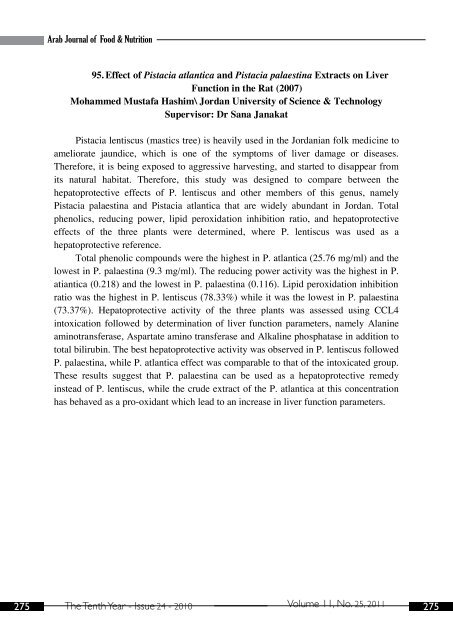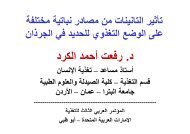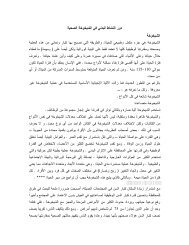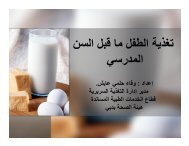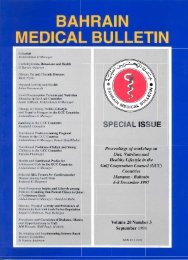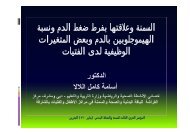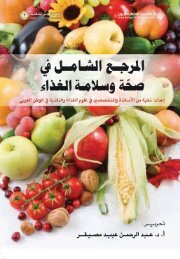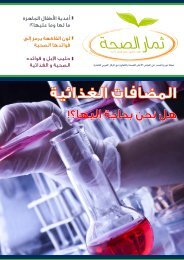- Page 1 and 2:
Arab Journal of Food & Nutrition Pu
- Page 3 and 4:
Arab Journal of Food & Nutrition Ab
- Page 5 and 6:
Arab Journal of Food & Nutrition vs
- Page 7 and 8:
Arab Journal of Food & Nutrition 3.
- Page 9 and 10:
Arab Journal of Food & Nutrition 4.
- Page 11 and 12:
Arab Journal of Food & Nutrition 5.
- Page 13 and 14:
Arab Journal of Food & Nutrition 7.
- Page 15 and 16:
Arab Journal of Food & Nutrition 8.
- Page 17 and 18:
Arab Journal of Food & Nutrition Th
- Page 19 and 20:
Arab Journal of Food & Nutrition 11
- Page 21 and 22:
Arab Journal of Food & Nutrition 13
- Page 23 and 24:
Arab Journal of Food & Nutrition 14
- Page 25 and 26:
Arab Journal of Food & Nutrition 16
- Page 27 and 28:
Arab Journal of Food & Nutrition Pr
- Page 29 and 30:
Arab Journal of Food & Nutrition 19
- Page 31 and 32:
Arab Journal of Food & Nutrition 20
- Page 33 and 34:
Arab Journal of Food & Nutrition 22
- Page 35 and 36:
Arab Journal of Food & Nutrition 23
- Page 37 and 38:
Arab Journal of Food & Nutrition 24
- Page 39 and 40:
Arab Journal of Food & Nutrition 26
- Page 41 and 42:
Arab Journal of Food & Nutrition 28
- Page 43 and 44:
Arab Journal of Food & Nutrition 29
- Page 45 and 46:
Arab Journal of Food & Nutrition an
- Page 47 and 48:
Arab Journal of Food & Nutrition me
- Page 49 and 50:
Arab Journal of Food & Nutrition 33
- Page 51 and 52:
Arab Journal of Food & Nutrition 35
- Page 53 and 54:
Arab Journal of Food & Nutrition 36
- Page 55 and 56:
Arab Journal of Food & Nutrition 38
- Page 57 and 58:
Arab Journal of Food & Nutrition 40
- Page 59 and 60:
Arab Journal of Food & Nutrition 42
- Page 61 and 62:
Arab Journal of Food & Nutrition 44
- Page 63 and 64:
Arab Journal of Food & Nutrition 46
- Page 65 and 66:
Arab Journal of Food & Nutrition 48
- Page 67 and 68:
Arab Journal of Food & Nutrition 49
- Page 69 and 70:
Arab Journal of Food & Nutrition ob
- Page 71 and 72:
Arab Journal of Food & Nutrition mo
- Page 73 and 74:
Arab Journal of Food & Nutrition 54
- Page 75 and 76:
Arab Journal of Food & Nutrition 57
- Page 77 and 78:
Arab Journal of Food & Nutrition 59
- Page 79 and 80:
Arab Journal of Food & Nutrition 61
- Page 81 and 82:
Arab Journal of Food & Nutrition 63
- Page 83 and 84:
Arab Journal of Food & Nutrition 65
- Page 85 and 86:
Arab Journal of Food & Nutrition 66
- Page 87 and 88:
Arab Journal of Food & Nutrition 68
- Page 89 and 90:
Arab Journal of Food & Nutrition 70
- Page 91 and 92:
Arab Journal of Food & Nutrition 72
- Page 93 and 94:
Arab Journal of Food & Nutrition 74
- Page 95 and 96:
Arab Journal of Food & Nutrition 76
- Page 97 and 98:
Arab Journal of Food & Nutrition 78
- Page 99 and 100:
Arab Journal of Food & Nutrition de
- Page 101 and 102:
Arab Journal of Food & Nutrition la
- Page 103 and 104:
Arab Journal of Food & Nutrition in
- Page 105 and 106:
Arab Journal of Food & Nutrition 83
- Page 107 and 108:
Arab Journal of Food & Nutrition 85
- Page 109 and 110:
Arab Journal of Food & Nutrition 86
- Page 111 and 112:
Arab Journal of Food & Nutrition 88
- Page 113 and 114:
Arab Journal of Food & Nutrition 90
- Page 115 and 116:
Arab Journal of Food & Nutrition 91
- Page 117 and 118:
Arab Journal of Food & Nutrition 93
- Page 119 and 120:
Arab Journal of Food & Nutrition 94
- Page 121 and 122:
Arab Journal of Food & Nutrition 95
- Page 123 and 124:
Arab Journal of Food & Nutrition 97
- Page 125 and 126:
Arab Journal of Food & Nutrition cu
- Page 127 and 128:
Arab Journal of Food & Nutrition 10
- Page 129 and 130:
Arab Journal of Food & Nutrition hi
- Page 131 and 132:
Arab Journal of Food & Nutrition Mi
- Page 133 and 134:
Arab Journal of Food & Nutrition 10
- Page 135 and 136:
Arab Journal of Food & Nutrition 10
- Page 137 and 138:
Arab Journal of Food & Nutrition Li
- Page 139 and 140:
Arab Journal of Food & Nutrition 2.
- Page 141 and 142:
Arab Journal of Food & Nutrition 4.
- Page 143 and 144:
Arab Journal of Food & Nutrition 5.
- Page 145 and 146:
Arab Journal of Food & Nutrition 6.
- Page 147 and 148:
Arab Journal of Food & Nutrition 7.
- Page 149 and 150:
Arab Journal of Food & Nutrition 8.
- Page 151 and 152:
Arab Journal of Food & Nutrition 9.
- Page 153 and 154:
Arab Journal of Food & Nutrition 10
- Page 155 and 156:
Arab Journal of Food & Nutrition 11
- Page 157 and 158:
Arab Journal of Food & Nutrition 12
- Page 159 and 160:
Arab Journal of Food & Nutrition ur
- Page 161 and 162:
Arab Journal of Food & Nutrition 15
- Page 163 and 164:
Arab Journal of Food & Nutrition 16
- Page 165 and 166:
Arab Journal of Food & Nutrition 17
- Page 167 and 168:
Arab Journal of Food & Nutrition 19
- Page 169 and 170:
Arab Journal of Food & Nutrition 20
- Page 171 and 172:
Arab Journal of Food & Nutrition 22
- Page 173 and 174:
Arab Journal of Food & Nutrition 24
- Page 175 and 176:
Arab Journal of Food & Nutrition Th
- Page 177 and 178:
Arab Journal of Food & Nutrition fe
- Page 179 and 180:
Arab Journal of Food & Nutrition in
- Page 181 and 182:
Arab Journal of Food & Nutrition va
- Page 183 and 184:
Arab Journal of Food & Nutrition ca
- Page 185 and 186:
Arab Journal of Food & Nutrition ev
- Page 187 and 188:
Arab Journal of Food & Nutrition 32
- Page 189 and 190:
Arab Journal of Food & Nutrition 0.
- Page 191 and 192:
Arab Journal of Food & Nutrition 35
- Page 193 and 194:
Arab Journal of Food & Nutrition 37
- Page 195 and 196:
Arab Journal of Food & Nutrition 39
- Page 197 and 198:
Arab Journal of Food & Nutrition 41
- Page 199 and 200:
Arab Journal of Food & Nutrition 43
- Page 201 and 202:
Arab Journal of Food & Nutrition 44
- Page 203 and 204:
Arab Journal of Food & Nutrition 45
- Page 205 and 206:
Arab Journal of Food & Nutrition so
- Page 207 and 208:
Arab Journal of Food & Nutrition of
- Page 209 and 210:
Arab Journal of Food & Nutrition 49
- Page 211 and 212:
Arab Journal of Food & Nutrition 51
- Page 213 and 214:
Arab Journal of Food & Nutrition 53
- Page 215 and 216:
Arab Journal of Food & Nutrition 54
- Page 217 and 218:
Arab Journal of Food & Nutrition Li
- Page 219 and 220:
Arab Journal of Food & Nutrition 57
- Page 221 and 222:
Arab Journal of Food & Nutrition 58
- Page 223 and 224:
Arab Journal of Food & Nutrition 60
- Page 225 and 226: Arab Journal of Food & Nutrition 61
- Page 227 and 228: Arab Journal of Food & Nutrition 63
- Page 229 and 230: Arab Journal of Food & Nutrition 64
- Page 231 and 232: Arab Journal of Food & Nutrition 66
- Page 233 and 234: Arab Journal of Food & Nutrition 67
- Page 235 and 236: Arab Journal of Food & Nutrition 18
- Page 237 and 238: Arab Journal of Food & Nutrition 70
- Page 239 and 240: Arab Journal of Food & Nutrition 71
- Page 241 and 242: Arab Journal of Food & Nutrition pr
- Page 243 and 244: Arab Journal of Food & Nutrition ot
- Page 245 and 246: Arab Journal of Food & Nutrition In
- Page 247 and 248: Arab Journal of Food & Nutrition 76
- Page 249 and 250: Arab Journal of Food & Nutrition 77
- Page 251 and 252: Arab Journal of Food & Nutrition 78
- Page 253 and 254: Arab Journal of Food & Nutrition 79
- Page 255 and 256: Arab Journal of Food & Nutrition 80
- Page 257 and 258: Arab Journal of Food & Nutrition 82
- Page 259 and 260: Arab Journal of Food & Nutrition in
- Page 261 and 262: Arab Journal of Food & Nutrition ±
- Page 263 and 264: Arab Journal of Food & Nutrition th
- Page 265 and 266: Arab Journal of Food & Nutrition 87
- Page 267 and 268: Arab Journal of Food & Nutrition 89
- Page 269 and 270: Arab Journal of Food & Nutrition 91
- Page 271 and 272: Arab Journal of Food & Nutrition re
- Page 273 and 274: Arab Journal of Food & Nutrition pl
- Page 275: Arab Journal of Food & Nutrition Ar
- Page 279 and 280: Arab Journal of Food & Nutrition nu
- Page 281 and 282: Arab Journal of Food & Nutrition 99
- Page 283 and 284: Arab Journal of Food & Nutrition 10
- Page 285 and 286: Arab Journal of Food & Nutrition 10
- Page 287 and 288: Arab Journal of Food & Nutrition at
- Page 289 and 290: Arab Journal of Food & Nutrition 10
- Page 291 and 292: Arab Journal of Food & Nutrition an
- Page 293 and 294: Arab Journal of Food & Nutrition 10
- Page 295 and 296: Arab Journal of Food & Nutrition 11
- Page 297 and 298: Arab Journal of Food & Nutrition 11
- Page 299 and 300: Arab Journal of Food & Nutrition 11
- Page 301 and 302: Arab Journal of Food & Nutrition In
- Page 303 and 304: Arab Journal of Food & Nutrition 11
- Page 305 and 306: Arab Journal of Food & Nutrition In
- Page 307 and 308: Arab Journal of Food & Nutrition 11
- Page 309 and 310: Arab Journal of Food & Nutrition 12
- Page 311 and 312: Arab Journal of Food & Nutrition Th
- Page 313 and 314: Arab Journal of Food & Nutrition 3.
- Page 315 and 316: Arab Journal of Food & Nutrition 4.
- Page 317 and 318: Arab Journal of Food & Nutrition 5.
- Page 319 and 320: Arab Journal of Food & Nutrition 6.
- Page 321 and 322: Arab Journal of Food & Nutrition 8.
- Page 323 and 324: Arab Journal of Food & Nutrition 9.
- Page 325 and 326: Arab Journal of Food & Nutrition Th
- Page 327 and 328:
Arab Journal of Food & Nutrition bu
- Page 329 and 330:
Arab Journal of Food & Nutrition 13
- Page 331 and 332:
Arab Journal of Food & Nutrition Li
- Page 333 and 334:
Arab Journal of Food & Nutrition 2.
- Page 335 and 336:
Arab Journal of Food & Nutrition 3.
- Page 337 and 338:
Arab Journal of Food & Nutrition 5.
- Page 339 and 340:
Arab Journal of Food & Nutrition st
- Page 341 and 342:
Arab Journal of Food & Nutrition Ev


